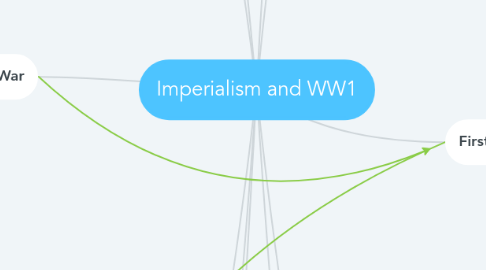
1. Imperialism
1.1. Late 19th century Early 20th century
1.1.1. Developed countries
1.1.1.1. Took control of
1.1.1.1.1. Regions all over the world
1.1.1.2. Colonial empires
1.1.1.2.1. They were
1.1.1.2.2. Areas of
1.1.1.2.3. Largest ones
2. Imperialism Expansion
2.1. Causes
2.1.1. Finance Capitalism
2.1.2. Rapid industrial development
2.1.3. Colonies provided industrilised countries with
2.1.3.1. Cheap raw materials
2.1.3.2. New markets
2.1.3.2.1. Sell manufactured goods
2.1.4. Symbol of international prestige
2.1.4.1. Most powerful countries
2.1.4.1.1. Competed to control
2.1.5. Attractive destination for European emigrants
2.1.5.1. Growing population
2.1.5.2. Machines replaced workers
2.1.5.2.1. Emigrated to look for
2.2. Consequences
2.2.1. Colonies controlled by a minority
2.2.1.1. Imposed European culture
2.2.2. Native people
2.2.2.1. Second class status
2.2.2.2. Racial segregation
2.2.3. Rivalry between imperial powers
2.2.3.1. WWI
2.2.4. Imbalanced world economy
2.2.4.1. Wealthy nations controlled and exploited
2.2.4.1.1. Less developed countries
3. The First World War
3.1. Great war
3.1.1. Between 1914-1918
3.2. War between
3.2.1. Various European Countries
3.2.1.1. And their colonies
3.2.1.2. African and Asian colonies too
3.2.2. The US
3.2.3. China
3.2.4. Japan
3.2.5. Latin American Republics
3.2.5.1. This is why it was considered a World War
3.3. Causes of the War
3.3.1. During the Armed Peace
3.3.1.1. Conflicts between countries
3.3.1.1.1. For the control of areas
3.3.1.1.2. Austro-Hungarian Empire- Russia
3.3.1.1.3. France-German Empire
3.3.1.1.4. G.B-German Empire
3.3.2. Pre-War atmosphere
3.3.2.1. European powers
3.3.2.1.1. Increase spending on arms
3.3.2.2. Goverments
3.3.2.2.1. Through the press
3.3.2.3. Pacifist movements
3.3.2.3.1. 2nd international
3.3.2.3.2. Catholic church
3.3.2.3.3. Failed
4. Phases of the war
4.1. Initial German offensives
4.1.1. Germany put the Schlieffen plan into effect
4.1.1.1. Invading
4.1.1.1.1. Belgium
4.1.1.1.2. North of France
4.1.1.2. When France was defeated
4.1.1.2.1. German advanced to Russia
4.1.1.3. It didn't succed because
4.1.1.3.1. France and G.B stopped German troops
4.1.1.3.2. Japan occupied German colonies in Asia
4.2. Trench Warfare
4.2.1. Both sides focused on defending positions
4.2.1.1. They build trenches
4.2.1.2. Used new weapons
4.2.1.2.1. Machine guns
4.2.1.2.2. Heavy artillery
4.2.1.2.3. Tanks
4.2.1.3. Continued attacking the same place
4.3. Incorporation and withdrawal of allies
4.3.1. 1917
4.3.1.1. US joined the war
4.3.1.1.1. Allies
4.3.1.2. Political and social revolution in Russia
4.3.1.2.1. Russia withdraw from the war
4.4. End of the War
4.4.1. 1918
4.4.2. Help of american troops and weapons
4.4.2.1. Allies won
4.4.3. Central powers seek peace because of
4.4.3.1. Exhaustion
4.4.3.2. Ever-increasing lack of resources
4.4.4. Wilhelm II abdicated
4.4.5. 11 November 1918
4.4.5.1. Armistice was signed
5. Society during war
5.1. Young men
5.1.1. conscripted or recruited
5.1.1.1. Into armed forces
5.2. Women had to leave their homes
5.2.1. Fill position men left
5.2.1.1. First time
5.2.1.1.1. Women allowed to do jobs in economic sectors
6. Consequences of the war
6.1. Social consequences
6.1.1. Decrease in population
6.1.2. Destruction of cities
6.1.3. Incorporation of women in workplce
6.1.3.1. Women began to fight for rights
6.1.3.2. Many women had to return to their homes
6.1.4. Loss of Europe's economic power
6.1.4.1. Material losses
6.1.4.2. US became the world's leading economic power
6.2. Territorial consequences
6.2.1. Austro Hungarian Empire
6.2.1.1. Austria, Hungary, Czechoslovakia and Yugoslavia
6.2.2. Russian Empire
6.2.2.1. Estonia, Latvia, Lithuania, Finland and Poland.
6.2.3. German Empire
6.2.3.1. the German Republic, part of Czechoslovakia and part of Poland.
6.2.4. Ottoman Empire
6.2.4.1. Turkey, Lebanon, Jordan, Syria, Iraq, part of Arabia and Palestine.
6.2.5. Italy
6.2.5.1. lost some territory to Yugoslavia
6.2.5.2. received Trieste from the former Austro-Hungarian Empire.
7. Imperialism
7.1. Tense international relationships
7.1.1. Rivalries
7.1.1.1. France
7.1.1.2. Germany
7.2. Industrialised countries
7.2.1. Big productions
7.2.2. Colonisation
7.2.2.1. Raw materials
7.3. Consumer society
7.3.1. Social inequalities
7.3.1.1. Economic crisis
8. Politics: tension in Europe
8.1. 1870-1914
8.1.1. Political tension
8.1.2. No armed conflicts
8.1.2.1. Although
8.1.2.1.1. Increase in production
8.2. Germany's foreign policy
8.2.1. Bismarck
8.2.1.1. Alliances
8.2.1.1.1. With
8.2.1.1.2. To prevent
8.2.2. Wilhelm II
8.2.2.1. Dismissed Bismarck
8.2.2.2. Starts a expansionist period
8.2.2.2.1. Tension with European countries
9. First World War
9.1. 28th June 1914
9.1.1. Archduke Franz Ferdinand
9.1.1.1. Assassinated in Sarajevo
9.1.1.1.1. Shot by a young Bosnian Serb nationalist
9.1.1.1.2. Austrian Government blamed Serbia
9.1.2. Austro Hungarian Empire
9.1.2.1. Declared war to Serbia
9.2. Alliances during the WW1
9.2.1. Countries supported sides
9.2.1.1. Based on their own interests
9.2.1.1.1. Pre-existing alliances
9.2.2. Central powers
9.2.2.1. Austro-Hungarian Empire
9.2.2.2. German Empire
9.2.2.3. Ottoman Empire
9.2.3. The allies
9.2.3.1. Serbia
9.2.3.2. Triple Entente
9.2.3.2.1. France
9.2.3.2.2. Great Britain
9.2.3.2.3. Russian Empire
9.2.3.3. Belgium
9.2.3.4. Japan
9.2.3.5. Italy
9.2.3.6. Romania
9.2.3.7. US
9.2.3.8. Greece
9.2.3.9. Portugal
9.2.3.10. China
9.2.3.11. Latin American republics
9.2.4. In 1915
9.2.4.1. Italy abandoned neutrality
9.2.4.1.1. Joined allies
10. War economy
10.1. Industrial sector
10.1.1. Production of military equipment
10.1.1.1. Weapons
10.1.1.2. Cannons
10.1.1.3. Planes
10.1.1.4. Uniforms
10.1.2. Agricultural and consumer goods decreased
10.1.2.1. There weren't enough laborers
10.1.2.1.1. Shortages of products
10.1.2.1.2. Prices increased
10.1.3. Governments intervened
10.1.3.1. To control the distribution of basic goods
10.1.3.1.1. Food
10.1.3.1.2. Rationing was introduced
11. Peace settlement
11.1. Paris Peace conference
11.1.1. Decide peace conditios
11.1.1.1. Imposed on defeated countries
11.2. US president Wilson
11.2.1. 14 points
11.2.1.1. Based on creating a league of Nations
11.2.1.1.1. Democratic states
11.2.1.1.2. Freedom of trade
11.2.1.1.3. Respect for a nation's right for self determination
11.3. Five separate treaties
11.3.1. Signed for each of the defeated country
11.4. Germany
11.4.1. Prohibition of
11.4.1.1. Heavy artillery
11.4.1.2. Planes
11.4.1.3. Submarines
11.4.2. Payment of huge economic reparations
11.4.3. Reduction of its territories
11.4.3.1. Alsace and Lorraine to France
11.4.4. Demilitarization of the region of Rhineland
11.4.5. Division of its eastern territories
11.4.5.1. Poland had access to the sea
